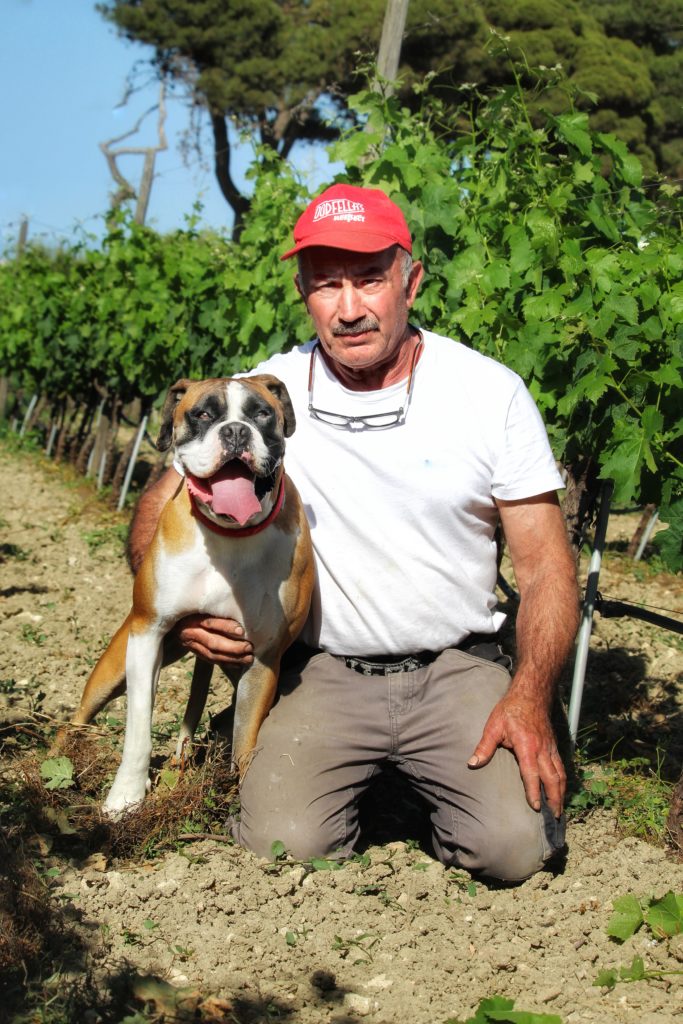All the helping hands
Every day, Martin Borg goes for a walk through his Rabat vineyard and inspects his vines, with pruners on his belt, and his dog, a good-natured boxer, for company.
If he sees a problem crop up, Martin can nip it in the bud, literally, or if he wants to he can call his viticulture expert at the Delicata winery to come over for advice.
There’s a constant breeze in the vineyard which helps keeping the vines healthy. Martin’s Merlot and Syrah grapes aren’t very susceptible to some of the challenges posed by humidity. Nonetheless, it takes continuous monitoring this time of year to produce top-class fruit, which is essential to making top-notch wine.

Martin Borg is a Vines for Wines affiliated grower.
Martin’s vineyard, planted in 2002, has been a reliable source for quality grapes for the Delicata winery ever since it produced its first crop in 2005. It’s one of the hundreds of pocket-sized vineyards, all varying in size up to 1 hectare, which together make up the sizeable Delicata domain.
In many cases, Delicata have been supplied with grapes by the same agrarian families for over 80 years. There’re strong links between the winery and the farming community, which have gotten only tighter since the inception of the Vines for Wines project in 1994.
Vines for Wines was launched with the aim of encouraging landowners to grow more and better grapes for the winery so as to meet the increasing demand for well-made Malta-grown wines.
The Delicata winery nowadays sources grapes from more than 220 grape-growing families in Malta and Gozo thanks to this scheme by which the Delicata viticultural unit has been assisting affiliated vignerons for more than 25 years.
Martin’s vineyard block of 4 tomniet (almost half a hectare) planted to about 2000 vines looks stunningly manicured, with thick rows of bright leaves and tiny green berries that catch the bypasser’s eye from the top of Saqqajja Hill.
Actually, the land sits right on top of the intersecting small tunnel through which the Malta Railway train or il-vapur tal-art (the land ship) used to run on its last leg towards Rabat. For most of the year, the vines’ roots draw rainwater that collects in the defunct underpass.
The lush canopies of vineyards like Martin’s benefit the farmer at harvest time, who by growing wine grapes instead of wheat, for example, can pocket a higher monetary yield per tomna. They also provide an attractive green-belt area of well-maintained farmland for everyone to enjoy.
Martin’s love for grape-growing is testimonial of the real sense of dedication among the grape growers that are part of Delicata’s Vines for Wines initiative. As a result, grape quality keeps on improving, and the connection with wine is simple: the better the grapes, the better the resultant wine.
The best wines are objects of great local pride, as Delicata’s award-winning wines show, and at the same time a lesson in what can be achieved when many helping hands join the cause for keeping Malta’s ancient winemaking heritage alive and well.
Anyone interested in contributing to a greener Malta by developing their land into a commercially viable vineyard or improving existing vineyards should contact the Delicata winery for a free consultation.
This article by Georges Meekers was first published in the Times of Malta on 19/06/20.

